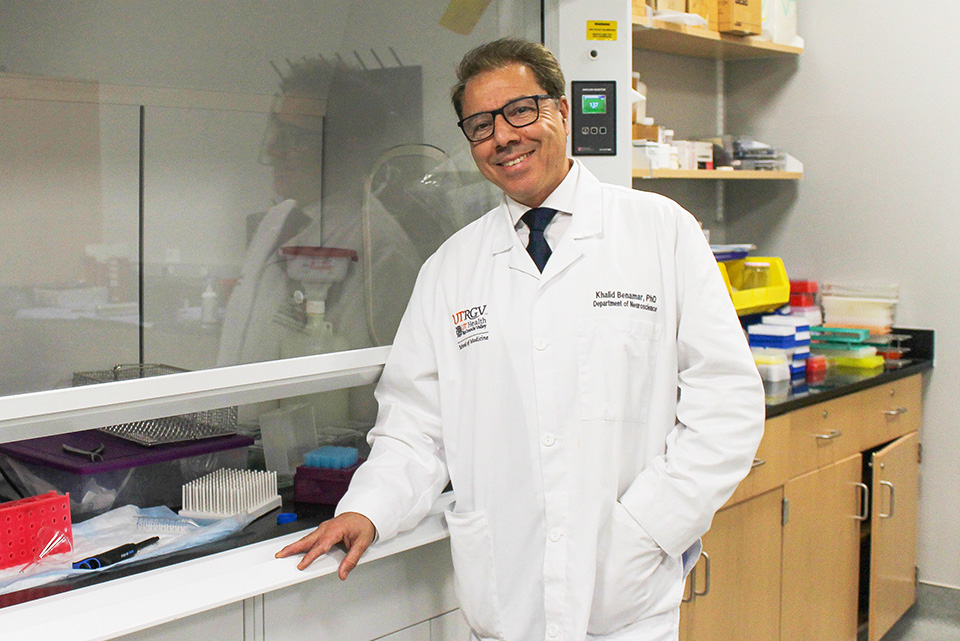By News and Internal Communications
RIO GRANDE VALLEY, TEXAS – JAN. 31, 2024 – The UTRGV School of Medicine has received five awards from the National Institutes of Health (NIH) for research on various neurobiological studies, including chronic pain, neurodegenerative diseases, HIV and Alzheimer’s disease.
Through these awards, UTRGV will conduct critical and much-needed research in the Rio Grande Valley that will help shed light on the complex connections and implications for the community.
LEADING THE WAY
Dr. Khalid Benamar, professor in the Department of Neurology and Behavioral Health at the UTRGV School of Medicine and principal investigator for the grants, will lead a team to study topics related to the neurobiology of chronic pain and comorbidities of neurodegenerative diseases, HIV and Alzheimer’s.
"Chronic pain, Alzheimer’s and HIV are health challenges that significantly alter and affect the lives of millions of people nationwide, yet research into these topics remains limited, especially in our region," Benamar said. "We aim to shed light on these complicated connections and what they mean for the Valley."
Benamar’s work will be pivotal as it will increase research diversity, introduce emerging research areas to UTRGV, and strengthen collaboration between the UTRGV School of Medicine and other institutions.
ADDRESSING CHRONIC PAIN
The team's focus on chronic pain is important, especially because it is a primary reason for adults to seek medical attention.
Current treatment options for chronic neuropathic pain are often ineffective and have associated side-effects. So, Benamar's team will test the efficacy and safety of novel pharmacological combination strategies for chronic neuropathic pain, with a focus on non-opioid therapy.
"Addressing chronic neuropathic pain requires a departure from conventional treatments to innovative pharmacological combinations,” he said. “Our focus is on non-opioid therapies aiming to revolutionize efficacy while prioritizing patient safety."
HIV AND ALZHEIMER’S: A NEW CHALLENGE
Benamar also will study the functional interaction between HIV and Alzheimer’s. His research aims to unravel the complex relationship between the two diseases and, potentially, pave the way for significant advancements in the treatment and understanding of these interconnected challenges.
Despite progress in controlling the HIV virus through combination antiretroviral therapy, there is a prevalent neurological complication known as HIV-associated neurocognitive disorder.
A new challenge arises as the HIV-positive population ages, with 50% of them in the United States now older than 50. Successful treatment regimens ensure HIV-positive individuals are surviving for decades with HIV, so concerns are mounting regarding potential overlaps with age-related neurodegenerative conditions, particularly Alzheimer’s.
Benamar and other researchers are concerned Alzheimer’s might exhibit an earlier onset or hastened progression in HIV-positive individuals, a concern that highlights an urgent and unmet need for investigation into potential connections between HIV and Alzheimer’s.
"This research is critical for individuals nationwide living with these health challenges,” Benamar said. “We are striving to provide hope and tailored solutions that can enhance the well-being of those living with these conditions in our community.”
ABOUT UTRGV
The University of Texas Rio Grande Valley (UTRGV) was created by the Texas Legislature in 2013 as the first major public university of the 21st century in Texas. This transformative initiative provided the opportunity to expand educational opportunities in the Rio Grande Valley, including a new School of Medicine and a School of Podiatry, and made it possible for residents of the region to benefit from the Permanent University Fund – a public endowment contributing support to the University of Texas System and other institutions.
UTRGV has campuses and off-campus research and teaching sites throughout the Rio Grande Valley including Brownsville (formerly The University of Texas at Brownsville campus), Edinburg (formerly The University of Texas-Pan American campus), Harlingen, Weslaco, McAllen, Port Isabel, Rio Grande City and South Padre Island. UTRGV, a comprehensive academic institution, enrolled its first class in the fall of 2015; the School of Medicine welcomed its first class in the summer of 2016, and the School of Podiatric Medicine in the fall of 2022.

